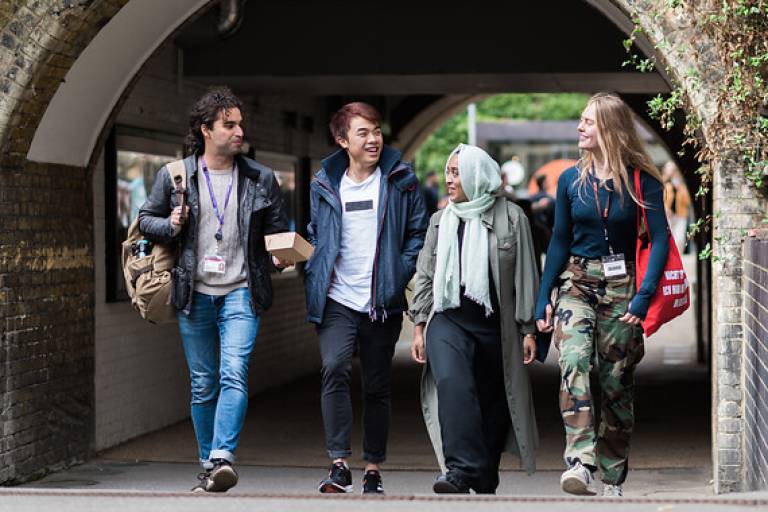The IGP is committed to embedding anti-racism across all of its operations, structures and purposes

- Inclusive recruitment and admissions
- Collectively educating ourselves about racism
- Working together to enact transformative change
At the IGP we recognise that racism and racial injustice are one of the fundamental challenges for global prosperity because we view true prosperity as based on equality and the creation of structures and institutions that allow communities to flourish on their own terms.
Structural and systemic racism are endemic in our societies, operating through sedimented and self-perpetuating systems in education, employment, housing, health care and criminal justice. Woven deep into the texture of our social relations, anti-racism requires renewed action and commitment across societies, regions and nations.
The IGP was founded on a commitment to start a different kind of conversation, to rethink prosperity for the 21st century, and to start from the experience of lives lived in search of a better quality of life for all. History, culture and place matter deeply to us all, and so diversity and inclusion must be at the core of any redefinition of prosperity.
IGP’s scholarship is based on community engagement and global collaboration, and takes a social justice and intersectional approach to tackling inequality and improving the quality of life for all, understanding and acting on the fact that racism is compounded by inequalities of gender, ethnicity, religion and sexual orientation. There can be no meaningful global prosperity or quality of life for all without addressing the structural and systemic barriers to people crafting their own good life.
Inclusive recruitment and admissions
A commitment to addressing social justice and the compounding injustices of intersectionality must include the IGP team, its student body, and its collaborators.
The IGP has an inclusive recruitment policy, involving external EDI champions at all stages, which is reviewed annually. Going forward, it will be made publicly available on the website, alongside metrics on recruitment, promotion and retention. We pledge to support and empower existing BAME staff through their career progression.
We will review the admission process for students to actively support black applicants and others from disadvantaged backgrounds and communities, and we will publish metrics on admission and student attainment. Scholarships to support students from disadvantaged communities and the global south are a priority for the IGP, and we will report in the autumn on new mechanisms for enhancing their support.
The IGP runs a mentorship programme and training programme for staff. Both will be reviewed and refocused on social justice to address issues of anti-racism and compounding intersectionalities. Information on these programmes will be made publicly available.
Collectively educating ourselves about racism
Action and activist movements such as Black Lives Matter will be central to bringing about wider societal change, but universities have a critical role to play. At the IGP, we are committed to playing our part and to exploring in depth what this means for us as a community of staff, students and collaborators, and to act on what we learn.
The first step is to educate ourselves, our students and others about racism. The IGP has already begun an internal and collective process with all staff to reflect and collectively decide on actions and changes that IGP will adopt across all of IGP’s work. This has already produced a rich set of suggestions that we will build on for a collective set of actions.
As part of this process, work has begun on a tool kit to support learning for staff and students, and to enhance our collective ability to have critical discussions around race and other issues of social justice. This will be developed over the next four months, and be subject to annual review, and actively deployed in staff mentoring and student support. It will be subject to ongoing revision as part of our collective commitment to doing better, and made publicly available as a resource.
Working together to enact transformative change
We perform an inclusive curriculum health check with our MSc students which runs annually. Social justice and intersectionality relating to theory, methods and ethics are integrated into the PHD program, and work to embed this further will be undertaken in the autumn. A monitoring process for external speakers to ensure underrepresented voices are being heard is in place, and will be extended. Going forward, we also commit to delivering as core parts of the MSc and PhD curricula, interactive sessions on how to support social justice work, including anti-racism, within student cohorts, extending beyond their time at the IGP.
We pledge our solidarity with the Black Lives Matter movement, and we commit to reforming and implementing concrete actions in our own research, teaching and working practices, including: recognising as individuals and as a collective our positions of privilege; using our work to break down barriers and to normalise important conversations on race; designing strategies for dismantling structural racism in our working spaces; and ensuring that our global work operationalises anti-racism at the conceptual, theoretical, practical and policy levels.
The IGP is committed to creating a supportive work environment where employees and all those who work and collaborate with us are empowered to have courageous conversations about race, and to working together to enact transformative change through the IGP’s mission to redefine prosperity for the 21st century.
 Close
Close

